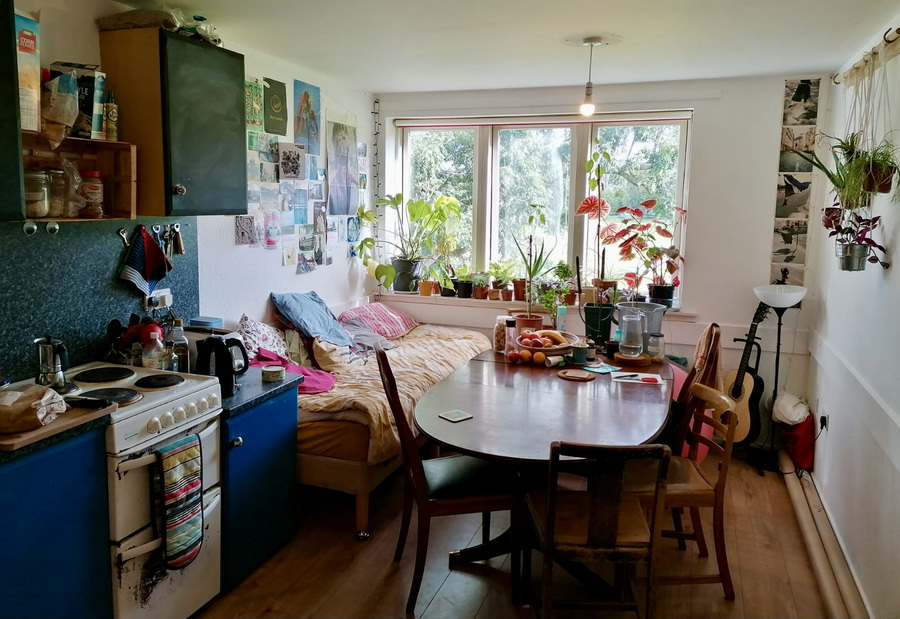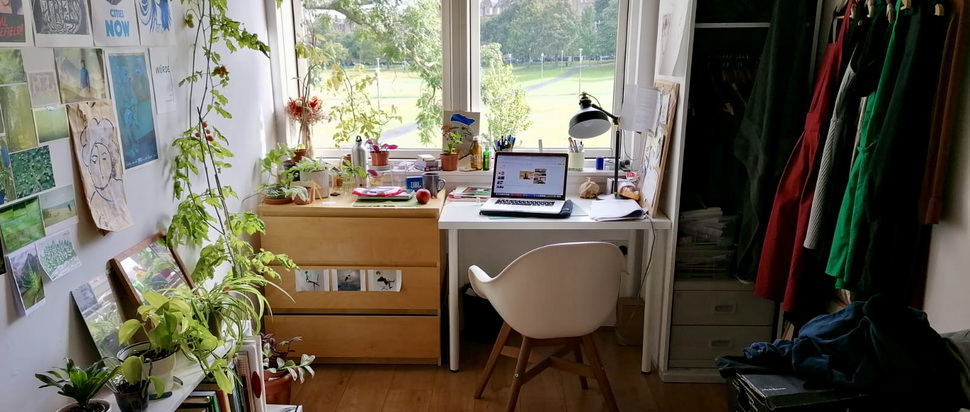House Mates: What student housing co-ops are all about
Landlords (still) suck. But what if there's another way? We speak to the Edinburgh Student Housing Co-op about how people need people and the empowerment found in communal, DIY living
Students are often charged with exacerbating housing crises in university towns, but in truth predatory private landlords, dodgy letting agencies and exploitative university accommodation services take advantage of first-time renters. However, small pockets of students across the UK are organising to imagine, and practise, a better way of living. Overlooking the Bruntsfield Links, sandwiching the Golf Tavern, the Edinburgh Student Housing Co-op appears unassuming from the outside. Yet inside, students have built a thriving community founded on autonomy, collaboration, and care.
“In Edinburgh, rent has increased 68% in the last decade and yet wages and even student loans have completely failed to increase to anywhere near that,” says Aditi Jehangir, Secretary of Scotland’s Tenants Union, Living Rent. “The rent freeze and subsequent rent caps also do not apply to purpose-built student accommodation (PBSA), so students are being hit with increases more frequently than the rest of the population.”
While student housing co-ops have existed in the US since the 1930s, the first in the UK were set up in 2014 by national organisation Student Co-Op Homes (SCH). Of the four pioneers, Edinburgh is the largest; 106 members live in 26 flats, while those in Brighton, Sheffield and Birmingham are single houses. The ESHC site was once an Edinburgh Napier accommodation, vacated in 2014 in favour of more modern (and expensive) halls. With the support of the SCH, and a Scotmid loan, a group of dedicated students leased the property from a housing association, cutting costs by taking on the renovation themselves.

A kitchen room at the Edinburgh Student Housing Co-op. Photo: Sofia Cotrona
Today, the co-op continues to be an autonomous space, owned and run democratically by its members who contribute to the day-to-day running of the building. Roles are available in maintenance and repairs, welfare outreach, budgeting and bills, as well as more creative jobs like Community Librarian, Events Co-ordinator, or Documentarian. The DIY nature of the co-operative structure means that most repairs and renovation is done in-house, allowing members to develop practical skills. Alex, the former ESHC Policy Manager, says, “After two years of living there I’d relaid multiple floors, built beds and benches, and learned how to install a new shower.”
This self-sufficient approach, combined with the not-for-profit ethos behind its establishment, allows the ESHC to keep rent low, despite slight increases in line with inflation. From September 2023 it will cost £374 pcm to live in the ESHC, a stark contrast to the skyrocketing rents of the surrounding area. This monthly contribution covers WiFi, energy, insurance, as well as shared necessities like toilet paper, soap, detergent and washing up liquid and any maintenance costs. “In my time, about two thirds of the rent went towards paying off our original lease, rather than lining landlords’ pockets,” says Alex. “There was never any fear about unexpected cleaning fees, jacked up rents, withheld deposits.” This low cost is a huge factor in why people choose a co-operative lifestyle; by saving hundreds a month, members can focus on their studies without the added stress of working to make rent.
Over the past few years, ESHC members renovated their basement into a multi-purpose social space, which houses a 4000+ book donated library of antiquarian and radical literature. This space is used as a meeting space for activist groups, in-house community events such as club nights, study sessions, drag performances, art exhibitions, and a queer film society. There are also designated quiet parts of the building. The majority of co-op socialising, however, takes place over the dinner table, in brightly-painted corridors, and cosy communal spaces.
“Everybody that lives [here] has become disillusioned by this neoliberal, individualist and atomised version of society, in which people don't know their neighbours and don't get involved with helping other people,” the Co-op Librarian, Jas, says. “It's clichéd to say that humans are social animals, but having friends on multiple floors, knowing that I can stay in my own flat or go upstairs for dinner – it’s a wonderful way to live.”
“Co-operatives won’t solve the housing crisis, but for those who are fortunate to have the opportunity, they can prove an oasis in the desert,” says Alex. Indeed, the ESHC receives hundreds of applications per year, and, due to the limited space, many are left disappointed. The ESHC is campaigning Scottish universities and city councils for an increase in housing co-ops to deal with the student housing crisis, and they urge students to contact their local councillors and MSPs. In Glasgow, a group dedicated to acquiring property for a co-op has been active since 2016, but needs the continuing support of students and locals to establish their vision.
As Jehangir puts it, “Co-ops might have a positive impact on a few tenants, but we need systemic change for all [... ] this government needs to build more social housing and to lower rents through rent controls to ensure everyone has access to safe, secure, affordable housing.”
Get more information on Edinburgh Student Housing Co-op at eshc.coop
For more details on Living Rent, visit livingrent.org
